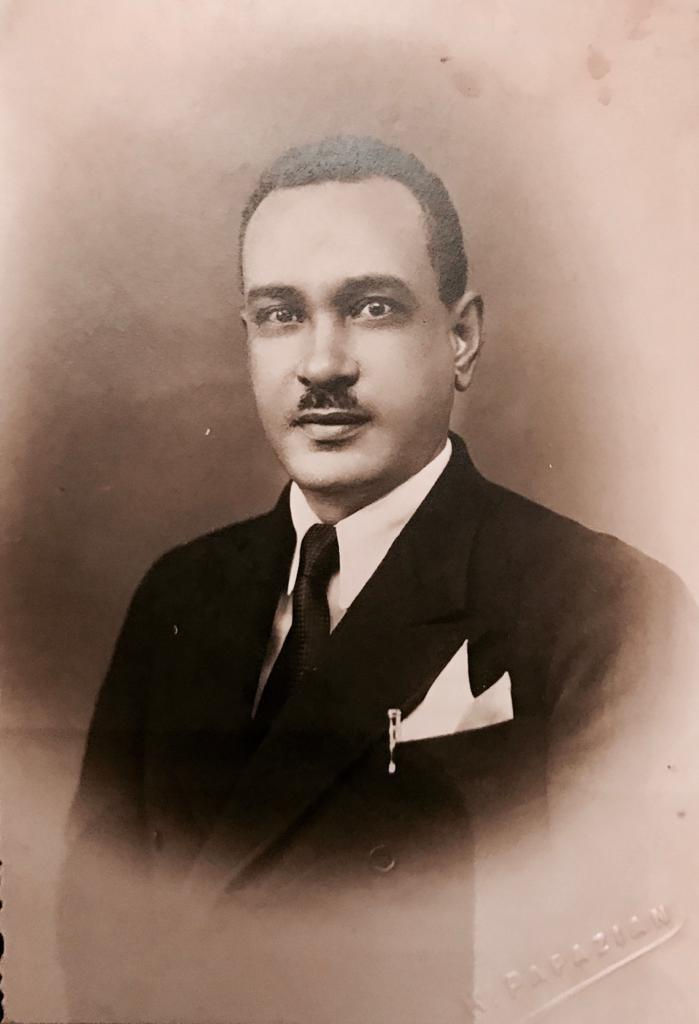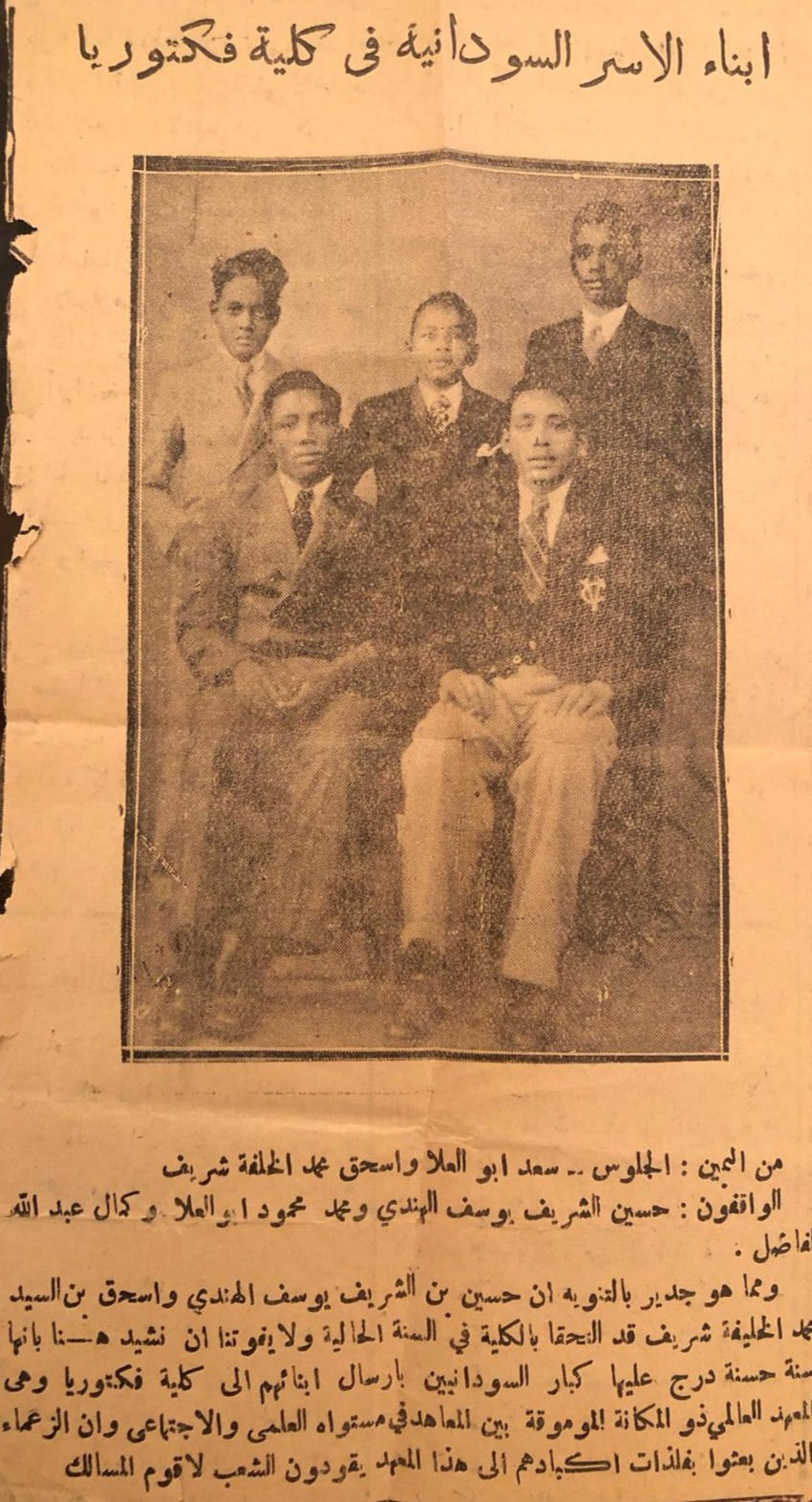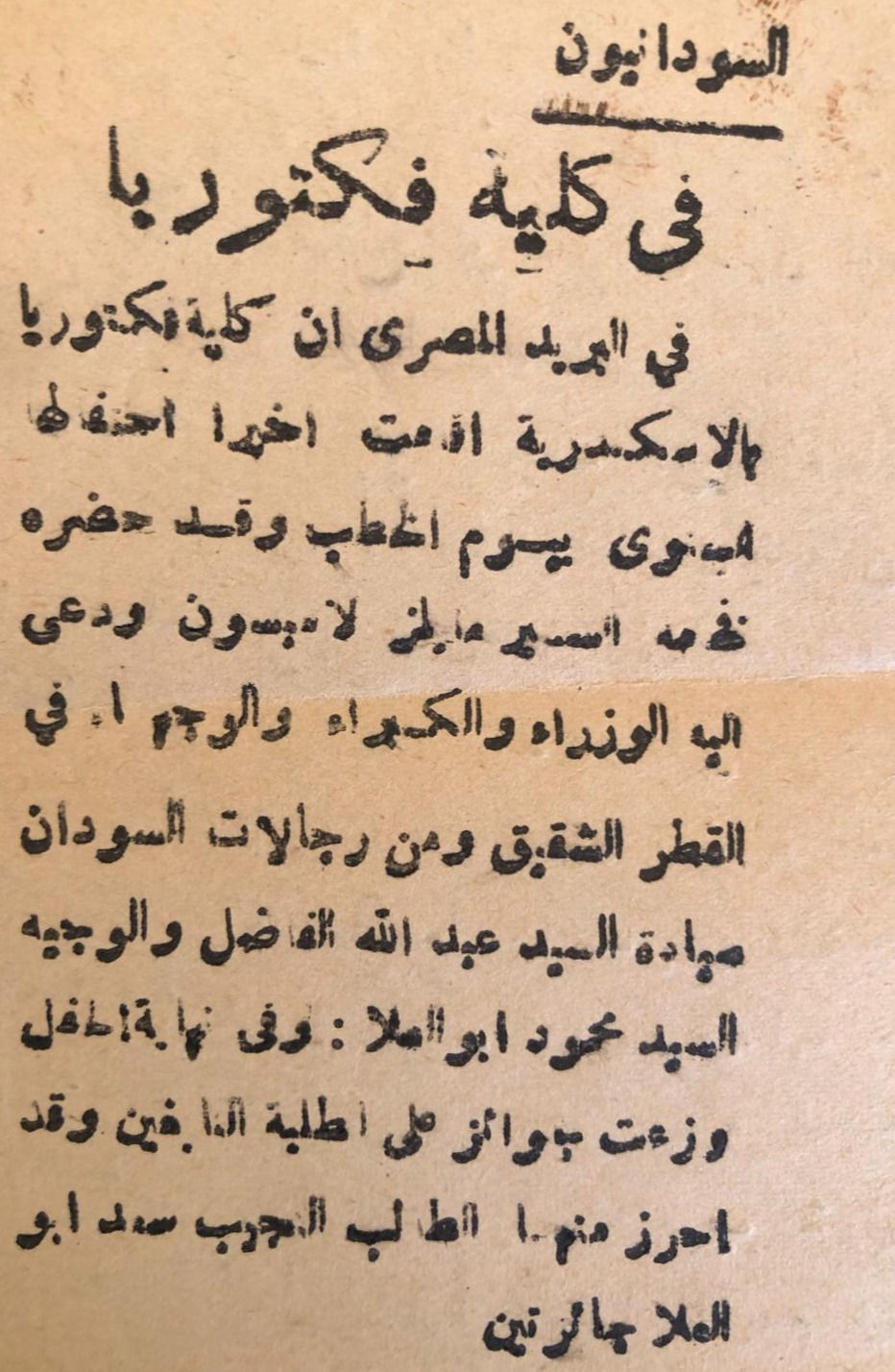The life and legacy of Saad Mustafa Aboulela
- Yousra Abdelmoneim

- Mar 29, 2021
- 7 min read
Updated: May 8, 2021
Background
Saad Mustafa Aboulela was born on the 17th of July 1922 in Omdurman, Sudan. He was the grandson of Hassanein Aboulela and Hassan Beik Abdelmoneim.
His father was Mustafa Hassanein Aboulela and mother Fatma Mohamed Aboulela.
He had four brothers: Abelsalaam, Abdullah, Izzat and Fouad, and five sisters, Sayda, Hayat, Hanim, Aisha, and Fawzia (in order from oldest to youngest).



Education, Career and Impact on the Sudanese Economy
He attended school at both the School of Omdurman and Coptic School in Khartoum and completed High School at Victoria College a British boarding school in Alexandria, Egypt considered to be the Eton College of the Middle East where he graduated in 1942. He excelled during his time at Victoria College, see transcript from newspaper published sharing that Saad Mustafa Aboulela had been awarded two prizes in an award ceremony and of him with other Sudanese students attending Victoria College during his time:



He was determined to study at Oxford University in England and got accepted, however due to World War II he was unable to travel. Due to his natural talent at a young age at business and commerce he kick started his career by working in the office of Hassanein Aboulela and Sons in Cairo, Egypt and Younis Ahmed and Abdelmoneim Mohamed in Khartoum, Sudan where he learnt the necessary skills and experience until 1948.

Then in 1948 at the age of 26 he co-founded alongside his uncles: Mohamed Aboulela, Awad Aboulela and his father Mustafa Aboulela the Group of Aboulela Companies known as:
Aboulela Trading Co Ltd
Aboulela Real Estate Co Ltd
Aboulela Agricultural Co Ltd
Aboulela Engineering Co Ltd
Aboulela Cotton Ginning Co Ltd
He was selected as one of the Board of Directors for all the above aforementioned five companies and in 1977 became chairman for all of the five boards of directors.
He took over the agricultural projects and through that became one of the pioneers and leaders in the cotton industry by leading on ginning, marketing and exporting of cotton. He also exported, sesame seeds, ground nuts, textiles…etc. He was exceptional in this sector and was awarded an honorary award by the University of Khartoum Faculty of Law for his impressive knowledge of company law. He was highly trusted by the Sudanese judiciary, was an authenticated business arbitrator and was often invited by the Sudanese Chamber of Commerce and Industry to help resolve business disputes. See honorary doctorate degree below:

He developed countless agricultural projects in the Blue Nile and White Nile states and supported the agricultural revolution in Sudan between 1950-1970 until the start of the Agricultural Reform Law by the government of President Gaafar Nemeiri which abandoned the private sector run agricultural schemes by taking away their licenses to manage the agricultural projects. This was similar to land reform schemes in Egypt which succeeded in achieving equitable distribution of land in Egypt because land ownership was restricted to few owners (known as Bashas) and farmers operated the land (known as falaheen). However, in Sudan there was no shortage of land and farmers owned the land. Managing companies helped operate the land and would purchase harvest for a fair price.
Despite developments regarding nationalisation and Agricultural Reform Law, agricultural activity, cotton ginning and international exportation continued and Saad Mustafa Aboulela was elected as president of the Union of Sudanese Cotton Producers in 1968 and continued in this post till he passed away. He exerted a large amount of effort to ensure fair compensation to all the private sector agricultural schemes. The culmination of his efforts succeeded in securing the rights and pay-outs for many agricultural schemes by 1987. They were never fully fairly compensated by the government, but given the circumstances they were able to put pressure on the government to partially compensate them.
Saad Aboulela won the hearts and respect of the people operating the agricultural land as his focus was to achieve sustainable development by providing healthcare, job opportunities, education and income to deprived communities. Aboulela family succeeded in this by building schools and hospitals in rural areas which transformed the lives of many living in rural parts of Sudan.



Saad Mustafa Aboulela helped establish the banking system and played a significant role within the financial system in Sudan. He was on the Board of Directors for the Bank of Sudan, Sudanese Commercial Bank (the first national Sudanese bank) and the French Sudanese Bank. He also helped manage the Gezira Scheme one of the largest irrigation projects in the World. His reputation preceded him as a successful and noble businessman.
He was elected as chairman of the board of directors for countless other institutions and companies, to mention a few:
Sudan Cotton Co Ltd
Sudanese Tea Co Ltd from 1969-1988
Coffee production and trade Co Ltd 1972-1986
National Cooperative Bank 1975-1978
Blue Nile Insurance Co Ltd 1981-1988
National Cigarette Co Ltd 1965-1988
Aldamazeen Agricultural and Livestock Production Co Ltd 1976-1986
Sudanese Chamber of Commerce 1977-1988
Blue Nile Cigarettes Co Ltd 1968-1988
Vice President of Sudanese Football Union
President of Al-Hilal Football Club
He was a member of the board of directors for the following institutions and many more not mentioned below:
University of Khartoum Board of Directors 1956-1988
Council of Trustees for Ahfad Schools 1964-1988
Council of Municipality of Khartoum 1959-1969
Regional Council of Khartoum 1961-1964
Sudanese Basketball Union
National Tobacco Co Ltd 1965-1988
Bank of Sudan 1978-1988
National Research Council 1977-1988
Sinar Cotton Ginning Co Ltd
Sudan Airways

Character and Interests
During his lifetime and for the purposes of work and leisure he travelled to many countries across Europe, Asia, Africa, America and the Middle East.

He was an extremely well read and educated man. He had an impressive library and book collection and had a keen interest to learn more, expand his knowledge and read about a range of topics from politics, history and economics. He was truly wise and a man of few words.
Saad Mustafa Aboulela was a major football fan and he was the president of Sudan's Hilal Football Club from the early 1950s, see photo with the football club below:




"He was offered to take on political positions, but he politely declined because his main goal and purpose was creating jobs and opportunities for Sudanese families, expanding the economic foundation, infrastructure, production and exports which was more important to him than having the title of a minister which he believed would distract him from his mission. He would pay Zakat to families and wouldn’t disclose the names of those families out of respect and would pay bonuses despite both not being tax exempt which all speaks highly of his character" - Mohamed Awad Aboulela his nephew
An example of his generosity was when there was a lady who hadn’t paid her rent for two years and the company raised a lawsuit against her, when he found out her circumstances he was upset at management, closed the lawsuit and registered the property in her name because she was widowed.
People that knew him described him as organised and meticulous. He wouldn’t leave his desk at the end of the working day unless he ensured every paper and paper clip was in its right place.
“He was very meticulous when it comes to work and business. He organized the Aboulela business; how it was run and ensured records were very well kept. If you go through a file of correspondence compiled by him, you would appreciate his work and how that made a difference for the family business. He was a perfectionist.” - Mohamed Awad Aboulela his nephew and mentee.
This was evident from his 1940 college books and handwriting, see extracts below:


Art and Music
Saad Mustafa Aboulela was extremely poetic and was very close to the famous singer Ahmed A-Mustafa and cousin of the poet Hassan Awad Aboulela. He wrote some of their musical lyrics and one of the famous songs he wrote for Ahmed Al-Mustafa was "Haram Ya Zaza" which he wrote to his wife Dr Zarouhi Sarkissian, whom he nicknamed as Zaza. It's a beautiful love song I highly recommend listening to if you haven't before.
Marital and Social Life
Saad Mustafa Aboulela was married twice. Initially to Suad Qurashi Aboulela whom he divorced and then married Dr Zarouhi Sarkissian in 1955, the first and youngest female Sudanese doctor. She supported him greatly and dedicated her life towards elevating his career. She was a smart and intelligent woman. They had a very trusting relationship, both seeking the best interest of each other. They had three children together, Leila, Nader and Nada. As the saying goes “behind every great man is a great woman” and this was very much the case here as she really understood and catered to his needs. They both positively influenced other people’s lives and genuinely cared about the family and others ( #relationshipgoals ).

Saad Mustafa Aboulela was very social and had a wide and far reaching network of friends. Some of his closest friends were: Basheer Mohamed Saeed, Mamoun Beheiry, Al-Sharif Hussein Al-Hindi, Mahdi Shareef, the poet Hassan Awad Aboulela and the singer Ahmed Mustafa. He treated everyone as an equal and always stayed in close contact with his family and friends. It is no surprise that for a person with such character, that the day before his passing away he had visited so many friends and family members, and people he took under his wing and looked after. They woke up to the sudden and sad news that he passed away when he woke up the next morning as if he’d said his farewells to them the day before, sub7anAllah.

His friends and family took the initiative and set up Saad Aboulela Hospital which is under the management of University of Khartoum Medical School which specialises in Obstetrics and Gynaecology which is a public hospital, in memory of a person who performed many great deeds for Sudan.
If you want to contribute to his legacy and donate to the hospital, please get in touch with me.
It was really important for me to write this piece as I never had the opportunity to meet my late Grandfather and I’ve heard countless beautiful stories and memories others have shared with me about him and his life, so the purpose of this blog was to pull some of it together into one place to preserve his legacy and share his story with others so that they can hopefully learn from his journey through life.
I still feel this blog does not do him justice as I could literally write an entire book about his life. The legacy my grandfather left us can’t be measured in material goods, or black and white photos. When I told my uncle Mohamed Awad Aboulela what I wanted to do and asked him to try and sum Saad Aboulela in a few words he said to me "You cannot capture in words his nature and impact. He was an all-round person. His skills were limitless in all areas and his behaviour was well-balanced. He won the hearts and respect of everyone across different age bands. They all loved him. He was فخم (fakhm)”
I think the most remarkable heritage that my grandfather has left us which is a quality I see shine through my mother (Nada Saad Aboulela) and other family members who knew him well is his love for family. His indomitable spirit enabled him to build a life of purpose and to always strive to improve himself and the lives of others. He has inspired me to always do my best, value family and to live a life filled with purpose. I hope that someday I can extend his legacy into our own generation.





Comments